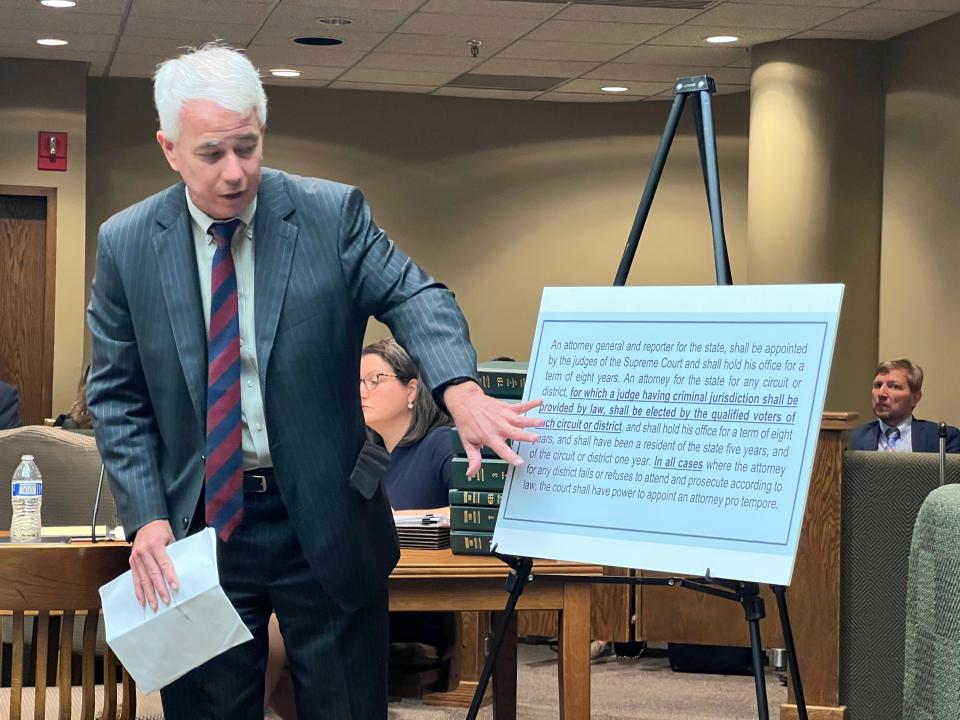TN appeals court questions role of local district attorneys, how much power can be stripped
JACKSON, Tenn. — A three-judge panel Tuesday afternoon heard arguments about the constitutionality of a state law that removes the power of locally elected district attorneys to represent the State of Tennessee in collateral review death penalty cases.
The three Tennessee Criminal Court of Appeals judges followed the appellate arguments with questions, each expressing skepticism to both sides at times, and hypotheticals. One judge asked just how far the state legislature could legally go in removing power from locally elected district attorneys.
"I'm extremely confident that we have a strong legal case," Shelby County District Attorney Steve Mulroy, one of the attorneys opposing the state in the case, said after arguments Tuesday. "The text of the [Tennessee] Constitution, the history behind it, the case law and practical realities all point in our direction. But that was a hard panel to read. They were certainly engaged, and they asked intelligent questions, but I don't know if my crystal ball works here."
Mulroy signed onto the constitutional challenge while it was still in state court in Shelby County. The original challenge was filed by defense attorney Robert Hutton, who is representing Larry McKay in a collateral review ― a judicial review of a judgment or claim ― of his death penalty conviction. Hutton argued, and Mulroy agreed, that the state law mandating that the Tennessee Office of the Attorney General handle cases like that violated McKay's rights to face prosecution by a locally elected prosecutor.
The law was ruled unconstitutional by Shelby County Criminal Court Judge Paula Skahan in July last year, and the AG's office appealed that ruling. Skahan, in her ruling, said the law was unconstitutional due to the general assembly not providing adequate notice to the public and that the law wrongfully removed jurisdiction from locally elected DAs. Skahan did not rule on whether the law violated local voting rights, which Mulroy and Hutton argued it did.
The Tennessee District Attorneys Conference has sided with Mulroy about the law's unconstitutional nature, and three neighboring DAs were at Tuesday's arguments.
"This is a 40-year-old capital case, and it's withstood many, many, many collateral attacks over the decades," Nicholas Spangler, with the state AG's office, said during arguments. "For this latest attack, which comes in the form of a time-barred error coram nobis petition, the general assembly saw fit to assign the attorney general the responsibility of defending these 40-year-old judgments in the trial court."

Judges on Tuesday seemed skeptical about the way the law and constitution were interpreted by both parties but also noted that the Court of Criminal Appeals has generally not handled questions of constitutionality. However, since the challenge was brought during the process of a criminal proceeding, it was appealed to this court.
Judge Robert Holloway questioned Spangler's interpretation that a DA's office is not exclusively able to represent the state when a filing takes place within a trial court. Mulroy and Hutton had argued that since a locally elected judge is tied to the case, a locally elected DA should be, too.
It was Spangler's position that a locally elected DA's office is tied to pre-conviction prosecution, barring recusal due to conflicts, but that connection ends after a conviction is reached. This spurred discussion between Judge Jill Ayers and Hutton and Mulroy, who stood opposite Spangler in their interpretation of when prosecution ends.
Ayers questioned repeatedly Hutton and Mulroy on this issue and pointed out that the duties of a locally elected DA are not explicitly listed in the constitution.
More: Report: Few felony arrests come from traffic stops in Memphis despite increased citations
Noted most prominently by Judge Robert Montgomery was the question over who represents the state during habeas corpus filings, which is the AG's office. Those proceedings, which were noted by Spangler, Montgomery, Hutton and Mulroy, are civil, however, and not criminal proceedings like coram nobis challenges.
This led Montgomery down another path of questioning, asking whether the General Assembly — with its ability to alter the jurisdiction of the courts — could have avoided a constitutional challenge on the law by making collateral review challenges a civil matter instead of a criminal matter. Spangler said he believed that the legislature could make that change, but that it would not be practical since coram nobis proceedings are a "continuation of a criminal case."
After the hearing, Mulroy said he believed Spangler helped their arguments by saying coram nobis proceedings are a continuation of a criminal case, but said Montgomery's questioning could be read in two ways.
"I wasn't sure myself whether [Montgomery] was thinking, 'Well, if they can do a workaround and change the jurisdiction of the court, then why are we even worried about this?' or whether he was saying, 'The legislature has a way to do this, but it didn't do it the right way. If they wanted to do this, they should use their power to change the jurisdiction of the court,'" Mulroy said. "The latter, of course, would be a positive sign for us because they are buying into our argument about the connection between the court and the powers of the DA."
A ruling was not issued Tuesday, nor was a date set for that ruling to be made. A ruling either way will likely result in another appeal, which would take the case to the Tennessee Supreme Court, should that court decide to take it up.
Lucas Finton is a criminal justice reporter with The Commercial Appeal. He can be reached at [email protected], or (901) 208-3922 and followed on X, formerly known as Twitter, @LucasFinton.
This article originally appeared on Memphis Commercial Appeal: Tennessee appeals court questions law altering power of district attorneys
